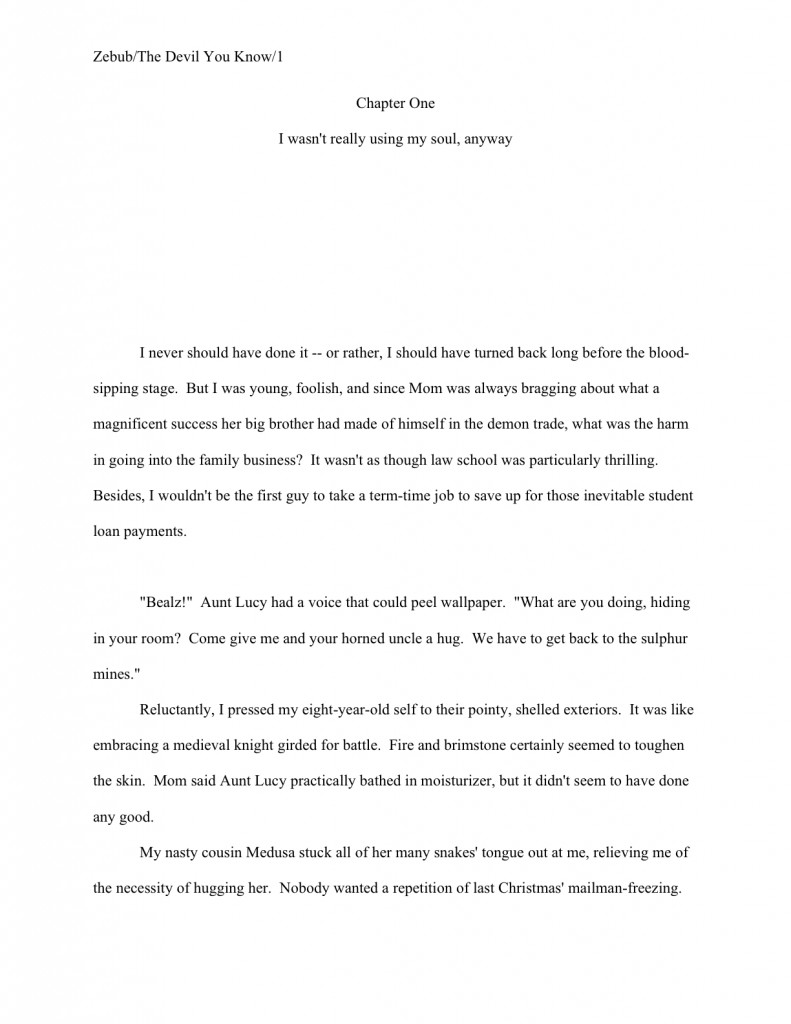
Throughout December, in case you hadn’t noticed, I’ve been concentrating on craft issues, the nitty-gritty business of constructing and polishing a narrative. Specifically, because my magic bloggers’ antennae tell me that quite a few of you are planning to query and/or submit right after the new year (or, if you’ll take my advice, three weeks later, after all of the writers whose New Year’s resolution to get their work out the door have begun to flag a bit), I’ve been talking about self-editing.
Today, you may or may not be delighted to hear, is no exception. But before I launch into the hardcore theory part of our program, allow me to tell you a little story.
To set it up: I’ve been traveling a good deal lately, boarding plane after plane. (My ailing Grumpy Relative lives far away, alas.) Since the airlines have started charging to check bags, many passengers have simply begun wheeling their bulky suitcases down the center aisle, fighting with one another to find space for them in the overhead bins. During the holidays, this battle royale necessarily entails jostling some passengers’ shopping bags full of presents too delicate or valuable to pack in checked luggage. In the midst of this ongoing conflict between the crammers and the fearful, I set my tale.
After my companion and I were seated — he in 18B, I in 18C — I felt my chest tighten: the gentleman behind me had evidently bathed that morning in cologne. That, or he was a secret agent for the airline transit authority, testing the viability of toxic scents in rendering nearby passengers senseless.
A sympathetic flight attendant told me I could move if I could find an empty seat free of nerve agent. I gobbled down some precautionary antihistamines to ward off an asthma attack, wiggled my way into the center aisle, and began scouting.
Up by row six, I was brusquely pushed aside by a tall woman in cashmere. Hastily, I vaulted out of her way, which unfortunately placed me in the lap of the man in 6C. I apologized for treating him like Santa Claus (he didn’t seem to mind much), but I could not budge: the imperious woman was blocking the aisle too thoroughly while searching for a place to stow her immense roll-on luggage in the already crammed overhead bins.
A time-conscious flight attendant murmured in her wake, tactfully replacing the shopping bags the passenger was blithely flinging to the floor. “Could you please hurry, ma’am?” the flight attendant kept saying. “We can’t close the cabin doors until everyone is seated, and we’re already behind schedule.”
Clearly, though, that baggage had to be placed just so. As the passenger made her noisy way down the aisle, I was able to free myself of my human seat cushion. Trying to make my way back to my seat, I felt like the caboose in a slow-moving train.
By the time I could smell where I was supposed to be, the picky passenger had managed to free enough space in the bin above row nineteen to shove her suitcase inside. The flight attendant and I pushed from behind.
As I slipped, choking, into my assigned seat, the woman turned to the flight attendant. “Well, that’s a relief. Now you need to switch my seat assignment.”
The flight attendant looked at her blankly. “You’re in 6E.”
“Yes,” the woman said testily, “but my bag is back here. I’ll have to wait until everyone else gets off the plane before I can grab it. I need to sit next to it.”
Feeling both revolutionary levels of resentment rising off the rest of the passengers and my throat constricting from the cologne fumes, I knew my time had come. “She can have my seat!” I exclaimed, leaping to my feet. “I don’t mind coming back for my carry-on.”
The woman had plopped herself into my seat before the flight attendant could even nod. She thanked no one.
The flight attendant propelled me forward to row six before the picky passenger could change her mind. I gave the five extra bags of pretzels she slipped me to the man who had let me share his lap.
Amusing, I hope? Good, but as those of you who have been hanging around Author! Author! has probably already begun suspecting by the end of the first paragraph, I didn’t share that anecdote with you purely for entertainment value, or even to vent. (I thought the other passengers were going to attack the rude woman. She must have delayed our departure by 15 minutes.)
No, I’ve included this story here because it has an editing problem — several, actually. Any guesses?
Hands up if you think it is too long. Is the action/narrative ratio off? Do you think a swifter telling would have allowed the comedy inherent in the situation to come out more clearly, or would you have liked to see more internal reaction from the narrator?
Which is right? Well, it depends upon what kind of narrative it is — and where the scene is going. In a memoir, the reader expects the narrator’s character to be revealed through her reactions to the events around her, so I might well want to ramp that up. In a romance, the reader would probably want a slightly different focus, perhaps showing my companion’s dismay at being first left alone, then saddled with another seatmate, or more complex interactions with the gentleman with the lap.
If, on the other hand, this is a thriller, and the reader has some reason to suspect that one of the passengers on the plane is carrying something lethal, this semi-amusing bit of business is merely a way to prolong the suspense, right? In that instance, I would want to edit to speed up this scene.
Many self-editors, though, as well as a hefty percentage of writers’ group critiquers, would not take intended book category into account when making the decision to trim this scene. All too often, short and terse is deemed appropriate for any type of book.
But it doesn’t always work, because — wait, I’m going to let you see why for yourself. Here’s that scene again, winnowed down to a just-the-facts-ma’am telling.
After my companion and I reached our seats, I felt my chest tighten: the guy behind me reeked of cologne. I waved down a flight attendant to ask if I could change seats, and she said yes, but she was too busy to find one for me. I gobbled down some precautionary antihistamines to ward off an asthma attack and began scouting.
A woman shoved me into some guy’s lap in row six. She was trying to find an overhead bin to stow her luggage, but the ones near her seat were already crammed. The flight attendant kept urging her to hurry, since the plane couldn’t start taxiing until everyone was seated. I remained trapped in the guy’s lap until the woman had exhausted all of the possibilities near her seat and moved up the aisle, with the flight attendant replacing the items she had displaced.
The woman finally found enough space for her bag above row nineteen, just behind me. But before I could buckle myself in, the woman demanded to sit near her bag, rather than in her assigned seat.
The passenger and flight attendant had a small argument about it, causing the other fliers to express resentment. I offered to switch seats with her, in order to solve both of our problems. The flight attendant gave me extra pretzels; I shared them with the guy whose lap I had occupied.
Not a very effective editing job, is it? It’s precisely the same story, true, but most of its charm has evaporated. Any guesses why?
If you immediately shot your hand into the air, exclaiming, “The humorous voice is gone!” lower that hand and pat yourself on the back with it. Very, very frequently, insecure self-editors will sacrifice narrative voice to pace, resulting in the kind of tale you see above.
But one of the main selling points a writer has for an agent or editor is freshness of voice! If it’s largely edited out, how is Millicent to know that this is a writer with an interesting and unique worldview?
If, on the other hand, you cried out, “In this version, the reader doesn’t really learn much about who these characters are or why this incident is important. It’s just a flat description of events,” you also deserve a pat on the back, because that’s also true. Characterization is another very frequent casualty of the revision process, because, well, it takes up room on the page.
I’m reserving today’s gold star, though, for those of you who noticed both of these problems, yet pointed out, “Hey, Anne, both of these examples share a flaw I’d like to see fixed: what are any of these people like? Admittedly, the second example exhibits much weaker characterization than the first, but most of these characters are one-note: the pushy passenger is rude, the flight attendant harried, and the guy with the lap vague. I’d find this story both more enjoyable and more plausible if the narrative showed them more. In fact, isn’t this a show, don’t tell problem?”
Wow, that’s one well-earned gold star. Both versions are indeed light in the characterization department.
Some lovers of terseness out there find that diagnosis a bit dismaying, I sense. “But Anne,” they protest, trying to keep their commentary brief, “isn’t the usual point of editing to cut out what doesn’t work? You admitted above that the original anecdote was a little long — won’t adding characterization just make it longer?”
Not necessarily — if the characterization is achieved not through analysis or lengthy descriptions, but through the inclusion of telling details. Such as:
The lanky woman seemed barely muscular enough to drag her leopard-print suitcase behind her, yet she surged up the aisle, flinging open every single overhead compartment on both sides as she passed. They gaped in her wake. The flight attendant leapt to keep the morass of holiday gifts, rolled-up winter coats, and overpacked suitcases from tumbling onto the passengers who had arranged their carry-ons so carefully just minutes before.
“Could you please hurry, ma’am?” she kept murmuring after every slam and between bites on her regulation pink-frosted lips. The first-class flight attendant was wearing the same color. “We can’t close the cabin doors until everyone is seated, and we’re already behind schedule.”
Thirteen sets of hanging doors later, the woman shoved aside a red shopping bag to make room for her suitcase. I helped the flight attendant wrestle the last three compartments shut before both of us provided the necessary muscle to inter the leopard. She did not thank us.
Obviously, these two paragraphs are not an adequate substitute for the entire story, but see what I have done here? The details provide characterization that neither the first version’s narrative reactions nor the second’s series of events showed the reader.
In this third version, however, the reader is neither left to fill in the specifics nor expected to guess what conclusions the author wants him to draw from these actions. The telling details make it perfectly plain that the lanky woman could not care less about anybody else’s comfort, feelings, or even rights: leaving those bin doors open behind her for the flight attendant and another passenger to close shows the reader what kind of person she is, just as the specifics about the volume of the luggage and the uniform lipstick, contrasted with the flight attendant’s consistent politeness, illustrate her dilemma, and the narrator’s automatically pitching in to help demonstrates her approach to the world.
Starting to get the picture? Good, because I’ve been yammering about telling details, albeit sometimes indirectly, all month.
But that’s appropriate, because telling details are the gem-like tiny touches so beloved of editors everywhere, the telling little details that illuminate character and moment in an indirect manner. The frequency with which telling little details appear in a manuscript is often one of the primary factors professional readers use in determining whether to keep reading.
Why? Well, more than almost any other device, they give the reader insight into the author’s worldview.
Sound like too amorphous a concept to be useful at revision time? It isn’t. A good writer sees the world around her with unique eyes, and — ideally, at least — powers of observation heightened to an extent that many non-writers would actually find painful.
This requires pretty sensitive nervous tissue, as H.G. Wells pointed out: he liked to call writers Aeolian harps (that’s a fancy way of saying wind chime, in case you were wondering), responding to our perceptions of the world through our art and, he hoped, making it better in the process.
Wells is now best-known for his science fiction, of course, but in his lifetime, many of his most popular novels were about social interactions. As I mentioned back on Veterans’ Day, his Mr. Britling Sees It Through was considered at the time THE definitive work on the British home front during the First World War. My favorite of his social novels is The Wife of Sir Isaac Harman, a comedy about marriage and the establishment of decent, affordable apartment buildings for young working women.
Okay, so his political beliefs were not particularly well-hidden in his social novels. But his eye for social nuance — and social comedy — was exceptionally good.
The tiny little details that our sensitive nervous tissue lead us to notice — the way you wear your hat, the way you sip your tea, as the song says — are a large part of what makes great writing seem almost miraculous to readers. Not everyone notices the worn-down heel of the left shoe of the man in his interview suit, after all, or the way the eyes of the president of the local charitable organization occasionally glaze with hatred while her mouth is loading the members with drippingly complimentary gushings.
Feeling special yet? You should: being aware of these telling little details is a gift, after all, an eye with which not very many human beings are endowed. Yet most writers don’t rely upon it nearly heavily enough in constructing their narratives.
And to someone whose job it is to read manuscripts all day, every day, seeing that gift wasted can start to get pretty annoying. “Where are those delightfully unexpected little insights?” the Millicents of the world think, running their fingertips impatiently down page 1. “Where is the evidence that this writer sees the world in a way that will change the way I see it myself?”
A tall order, yes, but — wait, do I hear some cries of distress out there? “Did you just say,” a strangled voice asks, “page ONE? As in my manuscript should produce evidence of my unique worldview and uncanny eye for telling little details that early in my book? Can’t I, you know, warm up a little?”
Great question, strangled voice. The answer is yes, if you want to make absolutely certain that an agency screener will read PAST the first page. (If you doubt this, please take a gander at the HOW NOT TO WRITE A FIRST PAGE category on the archive list at right. It’s a series on reasons that agents report for not reading past page 1, a pretty sobering group of posts.)
Some of you may find the necessity for cajoling reading more than a few paragraphs from people who, after all, asked you to send a chapter or 50 pages or your entire book. If you’re a novelist, it can be especially galling: presumably, if your forté as a writer were brilliant single-page stories, you would be entering short-short competitions, not writing 400-page books, right?
Believe me, I’m sympathetic to this view. If I ran the universe, agents and editors would be granted an entire extra day per week, so they could read at least 10 pages into every submission they request. Writers would get an extra day, too, and lots of paid vacation time, so we could polish our work to our entire satisfaction before we sent it out.
And Santa Claus would tumble down my chimney to shower me with presents every day of the year, instead of just Friday morning.
Unfortunately, I believe I have mentioned before, I do not run the universe. If we writers want to be successful, it behooves us to recognize that submissions are often read very, very quickly, and adapt our first few pages to that reality.
Sorry to be the one to tell you that. But before you condemn the rigors of the industry too vigorously, take a moment to consider the conditions that might lead to someone at an agency or publishing house to conclude that it would be desirable, or even necessary, to give a requested manuscript only a page to establish the author’s brilliance.
Lest we forget, Millicent the agency screener is the world’s most impatient reader, the one to whom you pray your manuscript will not be assigned: while some screeners and agents are looking to be wowed, Millicent is in a rush to get out the door; she’s put off her lunch date three times already this week, because she had to work through lunch, and she’s not going to miss it again.
It is now 12:10, she’s just noticed a run in her tights, and your manuscript is the next in the pile. How easy do you think it is going to be for it to impress her into reading past page 1?
I bring up Millicent’s foul mood not to scare you — but since a writer has absolutely no control over the mood of the person deciding whether to accept or reject his manuscript, it is worth preparing your submission so that it would impress EVEN Millicent at her most frustrated. That’s just good submission strategy.
Actually, I have a quite a bit of sympathy for the Millicents of the agenting world, as well as Maury, the editorial assistant who is her equivalent in publishing houses. They are expected to read reams and reams of paper very, very fast — and for this Herculean effort, they are not necessarily always paid. Often, in this harsh economy, this work is assigned to interns. If it’s the summertime, Millicent is probably on break from a good Northeastern college, someplace like Barnard, and since her parents can afford to support her while she takes an unpaid but résumé-building job, she’s probably from an upper-middle class background.
If it’s the rest of the year, or she has already graduated, she is probably paid — poorly — and lives in an apartment the size of a postage stamp with four other young people with similar jobs. Millie would not have gone into this line of work had she not liked reading — in fact, she may have writing aspirations herself, or she may want to become an agent or editor, so taking a job screening queries and submissions seemed like dandy on-the-job training at the time.
But now, after weeks on end of seeing hundreds upon hundreds of rather similar storylines, her capacity for appreciating literature has markedly dimmed. Sometimes, when she is especially cranky, a single line of awkward dialogue or two lines free of conflict can make her feel downright oppressed.
And your manuscript will have to get past Millie, and often also a senior assistant who has been screening manuscripts for even longer and has an even shorter boredom fuse, before it lands on the agent’s desk.
It had better not bore her.
Especially if, as occasionally happens, your manuscript is the next on her list to read immediately after she has broken up with her loutish boyfriend, she twisted her ankle clambering up from the subway, or she’s wondering how she’s going to pay the rent. And if poor Millie has just burned her lip on her non-fat double-shot tall latte…well, let’s just say that the first few pages of your manuscript had best be tight.
And feature at least a few delightful little details that will make Millicent sit up, forgetting her bright magenta lip, and cry, “Eureka! This writer showed me something I’ve never seen before, presented in magnificent, clear prose! Forget my lunch date — I have something to READ!”
The miracle of talent, as Mme. de Staël tells us, is the ability to knock the reader out of his own egoism. Let your first pages be living proof of that.
I think you have it in you; that gift of insight is what made you want to write in the first place, isn’t it? Don’t let the difficulties of the submission process dim that mission. Millicent, and readers everywhere, will be the better for the originality of your insight.
Show it to the world; don’t leave Millicent wondering about it. Oh, and share those overhead bins, please — that space is for everybody, and some of us are transporting glassware. Keep up the good work!





